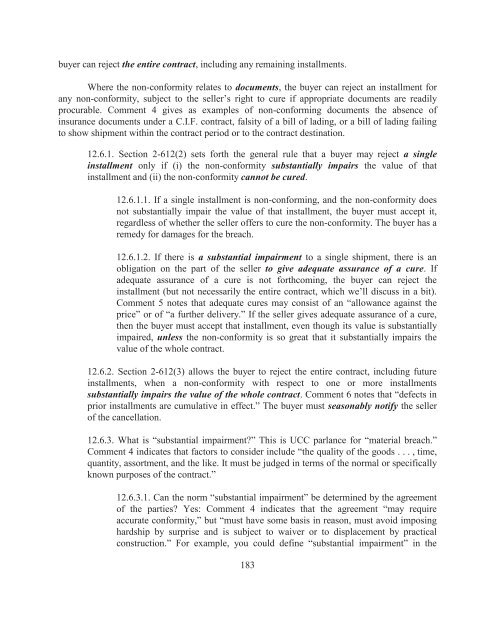Sales and Leases - A Problem-based Approach, 2016a
Sales and Leases - A Problem-based Approach, 2016a
Sales and Leases - A Problem-based Approach, 2016a
You also want an ePaper? Increase the reach of your titles
YUMPU automatically turns print PDFs into web optimized ePapers that Google loves.
uyer can reject the entire contract, including any remaining installments.<br />
Where the non-conformity relates to documents, the buyer can reject an installment for<br />
any non-conformity, subject to the seller’s right to cure if appropriate documents are readily<br />
procurable. Comment 4 gives as examples of non-conforming documents the absence of<br />
insurance documents under a C.I.F. contract, falsity of a bill of lading, or a bill of lading failing<br />
to show shipment within the contract period or to the contract destination.<br />
12.6.1. Section 2-612(2) sets forth the general rule that a buyer may reject a single<br />
installment only if (i) the non-conformity substantially impairs the value of that<br />
installment <strong>and</strong> (ii) the non-conformity cannot be cured.<br />
12.6.1.1. If a single installment is non-conforming, <strong>and</strong> the non-conformity does<br />
not substantially impair the value of that installment, the buyer must accept it,<br />
regardless of whether the seller offers to cure the non-conformity. The buyer has a<br />
remedy for damages for the breach.<br />
12.6.1.2. If there is a substantial impairment to a single shipment, there is an<br />
obligation on the part of the seller to give adequate assurance of a cure. If<br />
adequate assurance of a cure is not forthcoming, the buyer can reject the<br />
installment (but not necessarily the entire contract, which we’ll discuss in a bit).<br />
Comment 5 notes that adequate cures may consist of an “allowance against the<br />
price” or of “a further delivery.” If the seller gives adequate assurance of a cure,<br />
then the buyer must accept that installment, even though its value is substantially<br />
impaired, unless the non-conformity is so great that it substantially impairs the<br />
value of the whole contract.<br />
12.6.2. Section 2-612(3) allows the buyer to reject the entire contract, including future<br />
installments, when a non-conformity with respect to one or more installments<br />
substantially impairs the value of the whole contract. Comment 6 notes that “defects in<br />
prior installments are cumulative in effect.” The buyer must seasonably notify the seller<br />
of the cancellation.<br />
12.6.3. What is “substantial impairment?” This is UCC parlance for “material breach.”<br />
Comment 4 indicates that factors to consider include “the quality of the goods . . . , time,<br />
quantity, assortment, <strong>and</strong> the like. It must be judged in terms of the normal or specifically<br />
known purposes of the contract.”<br />
12.6.3.1. Can the norm “substantial impairment” be determined by the agreement<br />
of the parties? Yes: Comment 4 indicates that the agreement “may require<br />
accurate conformity,” but “must have some basis in reason, must avoid imposing<br />
hardship by surprise <strong>and</strong> is subject to waiver or to displacement by practical<br />
construction.” For example, you could define “substantial impairment” in the<br />
183


















